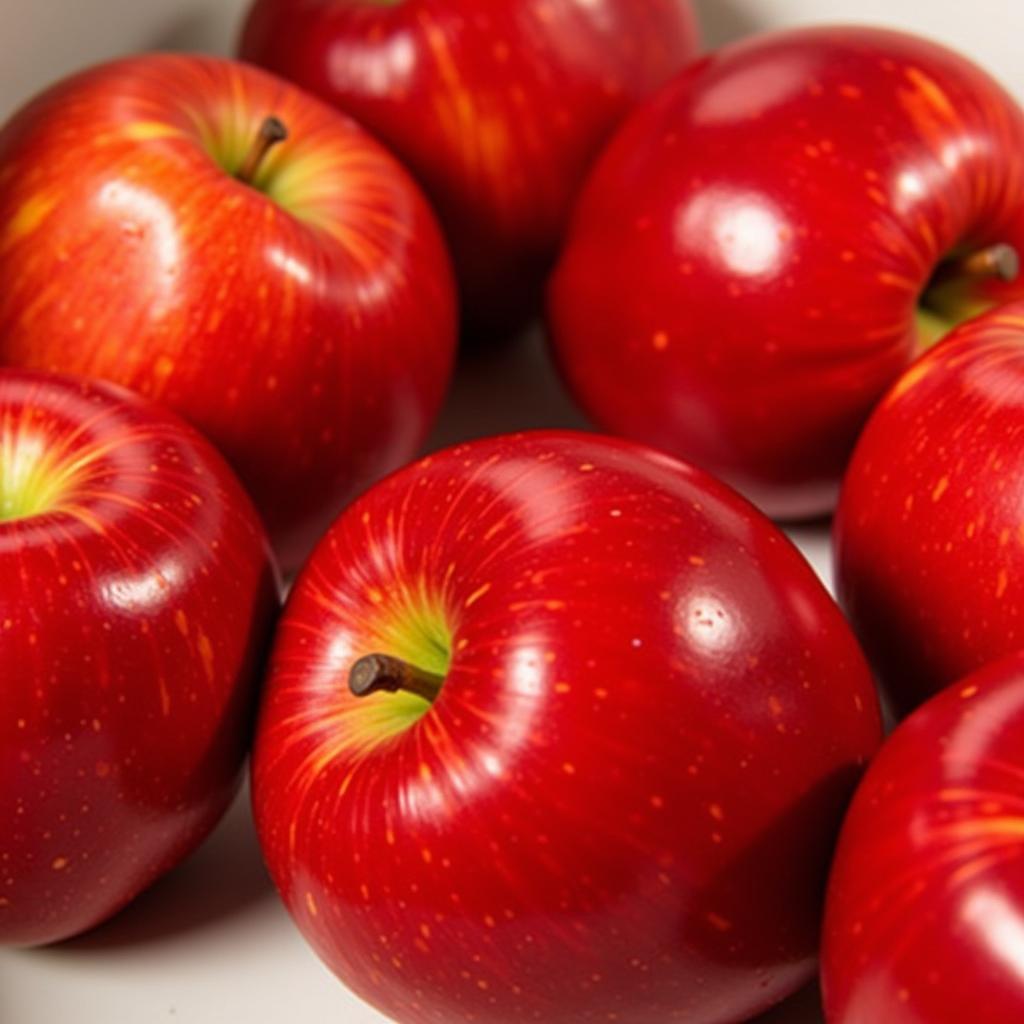Carnauba wax in food has become a common ingredient, raising concerns about potential side effects. This naturally derived wax is used as a glazing agent to give fruits, vegetables, and candies a shiny appearance. While generally considered safe, it’s essential to understand the potential impacts of consuming carnauba wax.
What is Carnauba Wax and How is it Used in Food?
Carnauba wax, also known as Brazil wax, is a vegetable wax obtained from the leaves of the Copernicia prunifera palm tree, native to Brazil. It’s composed of various esters, fatty alcohols, and fatty acids. In the food industry, it acts as a glazing agent, providing a glossy finish and preventing moisture loss. Think of that perfectly polished apple or the shiny coating on your gummy bears – that’s often carnauba wax! It’s also used in some chewing gums and dental floss to prevent sticking. Beyond food, carnauba wax finds applications in car waxes, shoe polishes, and even cosmetics.
 Shiny Apples Coated with Carnauba Wax
Shiny Apples Coated with Carnauba Wax
Carnauba Wax in Food: Side Effects and Safety Considerations
The U.S. Food and Drug Administration (FDA) and other international regulatory bodies generally recognize carnauba wax as safe for consumption. However, some individuals may experience minor side effects, particularly those with sensitive digestive systems.
Potential Side Effects of Consuming Carnauba Wax
While rare, some reported side effects include:
- Bloating and Gas: Carnauba wax can be difficult to digest for some, leading to these discomforts.
- Constipation: The wax can contribute to bulk in the stool, potentially causing constipation, especially if consumed in large quantities.
- Allergic Reactions: Although rare, some individuals might experience allergic reactions, such as skin rashes or itching.
Is Carnauba Wax Vegan and Vegetarian-Friendly?
Good news for those following plant-based diets! Carnauba wax is completely vegan and vegetarian-friendly. It’s a natural plant-based product, making it a suitable alternative to animal-derived waxes like shellac.
How Much Carnauba Wax is Safe to Consume?
There’s no officially established limit for carnauba wax consumption. However, since it passes through the digestive system mostly undigested, excessive intake could potentially exacerbate any existing digestive issues. Moderation is always key.
“While carnauba wax is generally safe, listening to your body is important,” advises Dr. Emily Carter, a registered dietitian. “If you experience any digestive discomfort after consuming foods containing carnauba wax, it’s best to reduce your intake or avoid it altogether.”
Minimizing Potential Side Effects
If you’re concerned about potential side effects, here are some tips:
- Choose organic produce: Organic fruits and vegetables are less likely to be coated with carnauba wax.
- Wash produce thoroughly: While washing might not remove all the wax, it can help reduce the amount you consume.
- Read food labels carefully: Check ingredient lists for “carnauba wax” or “E903.”
Conclusion: Navigating Carnauba Wax in Your Diet
Carnauba wax in food, while generally safe, can present minor side effects for some individuals. Understanding its purpose and potential impacts allows you to make informed choices about your diet. By following the tips outlined above, you can minimize potential side effects and enjoy the benefits of a balanced diet.
FAQ
- What is carnauba wax made of? Carnauba wax is derived from the leaves of the Copernicia prunifera palm tree.
- Is carnauba wax safe to eat? Regulatory bodies consider it generally safe for consumption.
- What are the side effects of carnauba wax? Some may experience bloating, gas, constipation, or allergic reactions.
- How can I avoid consuming carnauba wax? Choose organic produce, wash produce thoroughly, and read food labels.
- Is carnauba wax vegan? Yes, carnauba wax is a plant-based product.
- What is the E number for carnauba wax? It’s listed as E903 on food labels.
- What foods contain carnauba wax? It’s commonly found on fruits, vegetables, candies, and chewing gum.
“Moderation and mindful eating are crucial for a healthy lifestyle,” adds Dr. David Miller, a gastroenterologist. “Pay attention to your body’s signals and consult a healthcare professional if you have any concerns about specific food ingredients.”
You can find more helpful information about food additives and healthy eating on our website. Check out our articles on “Understanding Food Labels” and “The Importance of a Balanced Diet.”
Need support? Contact us 24/7: Phone: 02437655121, Email: minacones@gmail.com or visit us at 3PGH+8R9, ĐT70A, thôn Trung, Bắc Từ Liêm, Hà Nội, Việt Nam.